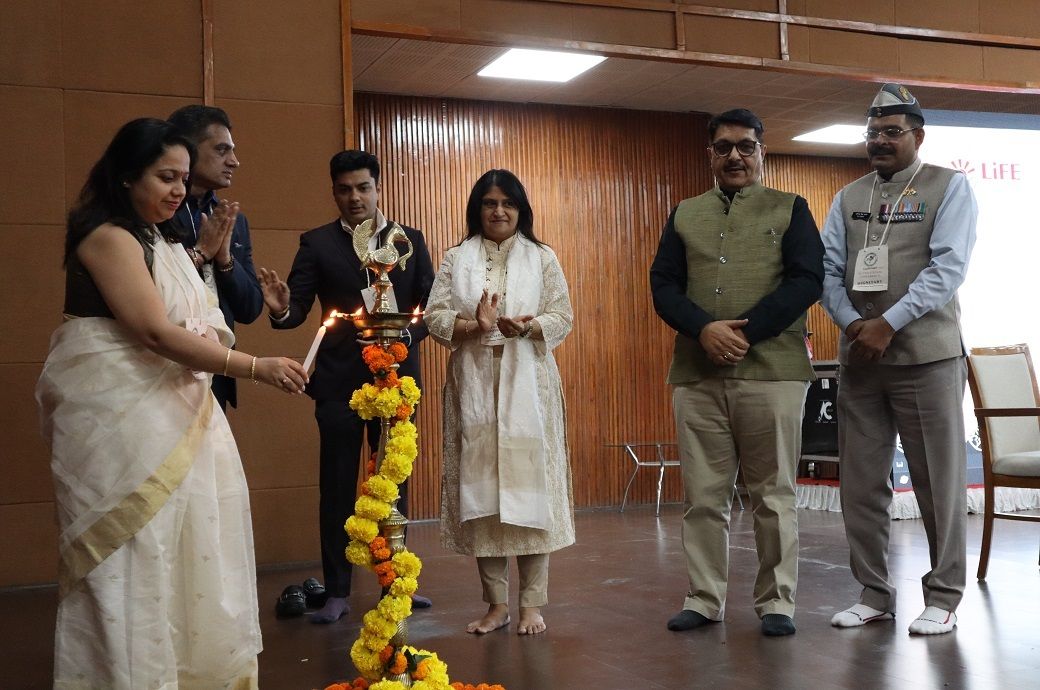
Pradyumna Vyas, president-elect of the World Design Organisation, and one of the keynote speakers at the conference’s inauguration, emphasised the importance of placing humanity at the core of design education and advocated for the integration of traditions into designing labs. He emphasised design education, which can bring nature to the forefront as a progress model.
Vyas also spoke about how Indian traditions are rooted in sustainable practices and embody a philosophy of co-existence. He further mentioned that the traditions consistently advocate for the recycling and reuse of resources, highlighting the value of handloom and handicrafts in achieving a zero-waste model.
Vyas further suggested that NIFT should set up a natural fibre research centre, as various types of fibres are available in abundance in India. He called on design students to come up with new ideas and advise the industry on how to adopt sustainable practices. He said that psychological pressure forces consumers to buy fashionable products. The boom in fashion products has compelled one to think about sustainability, as the linear economy promotes the piling of waste after the use of a product.
Mona Khandhar, IAS Principal Secretary of Gujarat’s Revenue Department, stated that there are challenges related to environmental protection and climate change, making sustainability a contemporary issue. She emphasised the importance of the theme of the 3rd International Conference, highlighting that while the Western world prioritises a profit-driven progress model, Indian values and ethos are more focused on creativity and innovation.
Khandhar noted that while artificial intelligence and other modern technologies have enhanced productivity and provided comfort for human beings, they cannot compete with human intelligence. She stressed that creativity and innovation are paramount. Khandhar also expressed the importance of bringing forth cultural values and ethos, which can offer sustainable approaches.
Ronak Chiripal, director of Chiripal Group, emphasised the crucial importance of sustainability in today’s world. He highlighted that his company is prioritising the reuse and recycling of available resources, with a notable achievement of reusing 90 per cent of water. Additionally, the company has made substantial investments in solar energy. Chiripal pointed out that in the current global scenario, the entire world needs to think about sustainability.
Chandrima Chatterjee, secretary general of the Confederation of Indian Textile Industry (CITI), emphasised the need to find a middle path in sustainability. She stressed that India must develop itself as a responsible resourcing destination. The Indian industry is encountering several challenges in adopting sustainable practices in their business activities, and it needs to find feasible solutions for these issues. Chatterjee underscored the importance of integrating the global value chain with sustainability.
Captain Yogendra Yadav, recipient of the highest Gallantry Award - Param Vir Chakra and Kargil hero, was also a keynote speaker at the inaugural session of the conference. He encouraged the audience to approach their goals with passion, believing that this would yield better results in their efforts towards preserving nature. Drawing from his experiences at the war front and the values of his rural life, he compared the critical issue of sustainability in the textile industry to the challenges he faced and the lessons he learned in combat.
Prof Sameer Sood, director of NIFT Gandhinagar, expressed that the third edition of the International Conference will introduce new ideas and approaches towards sustainability. He emphasised the importance of working towards producing healthy fabrics and garments.
NIFT is also organising discussions on various topics, along with a cultural fashion show. The Conference will feature three panel discussions on ‘Brand Bharat: Sustainability, Scale, and Skill’, ‘Viksit Bharat @ 2047’, and ‘Ubharta Bharat: Udyamita se Udyog tak’.
Fibre2Fashion News Desk (KUL)